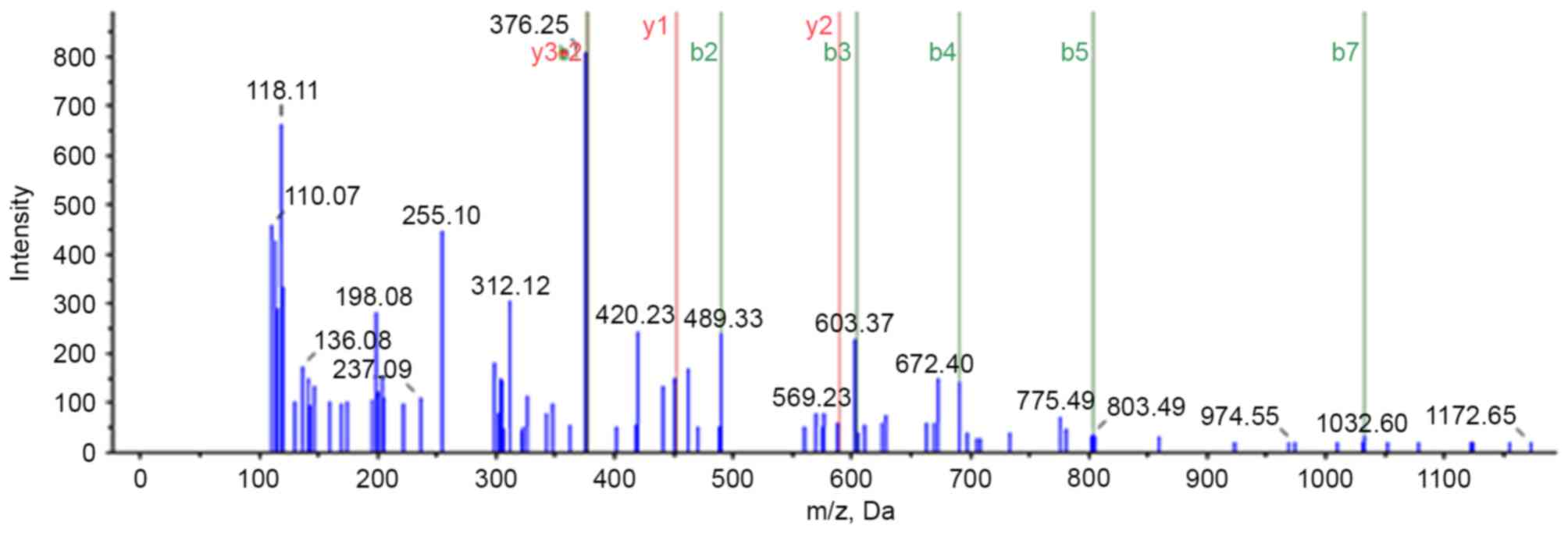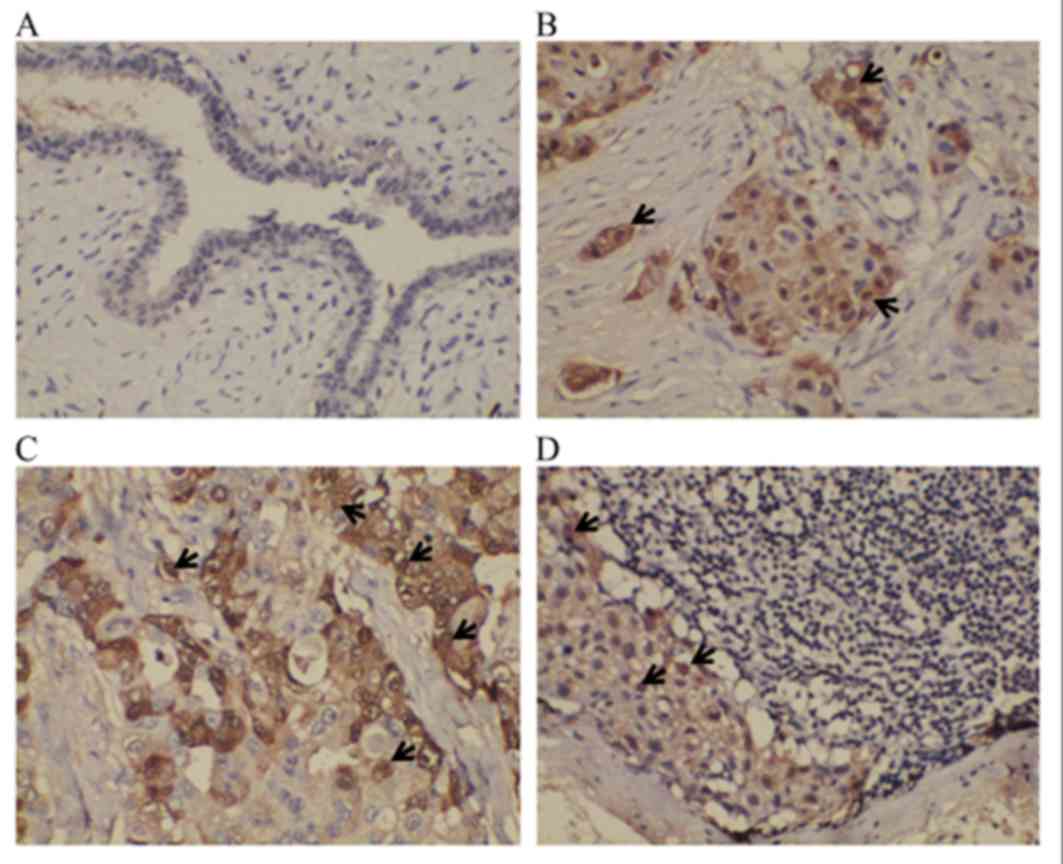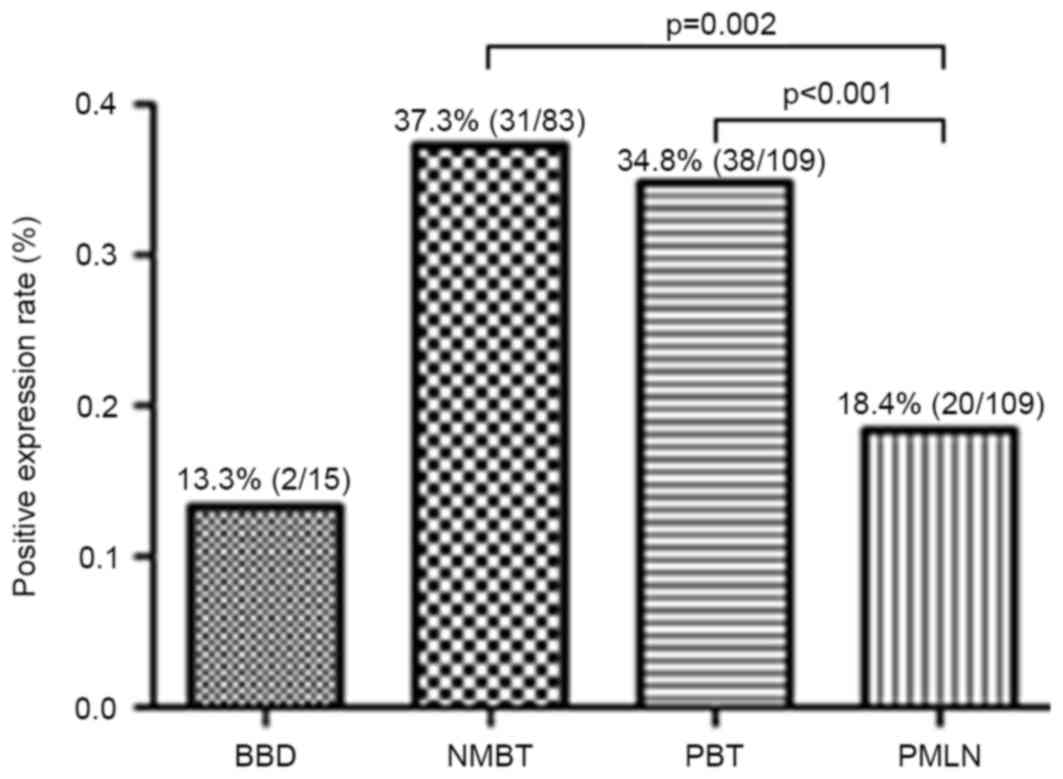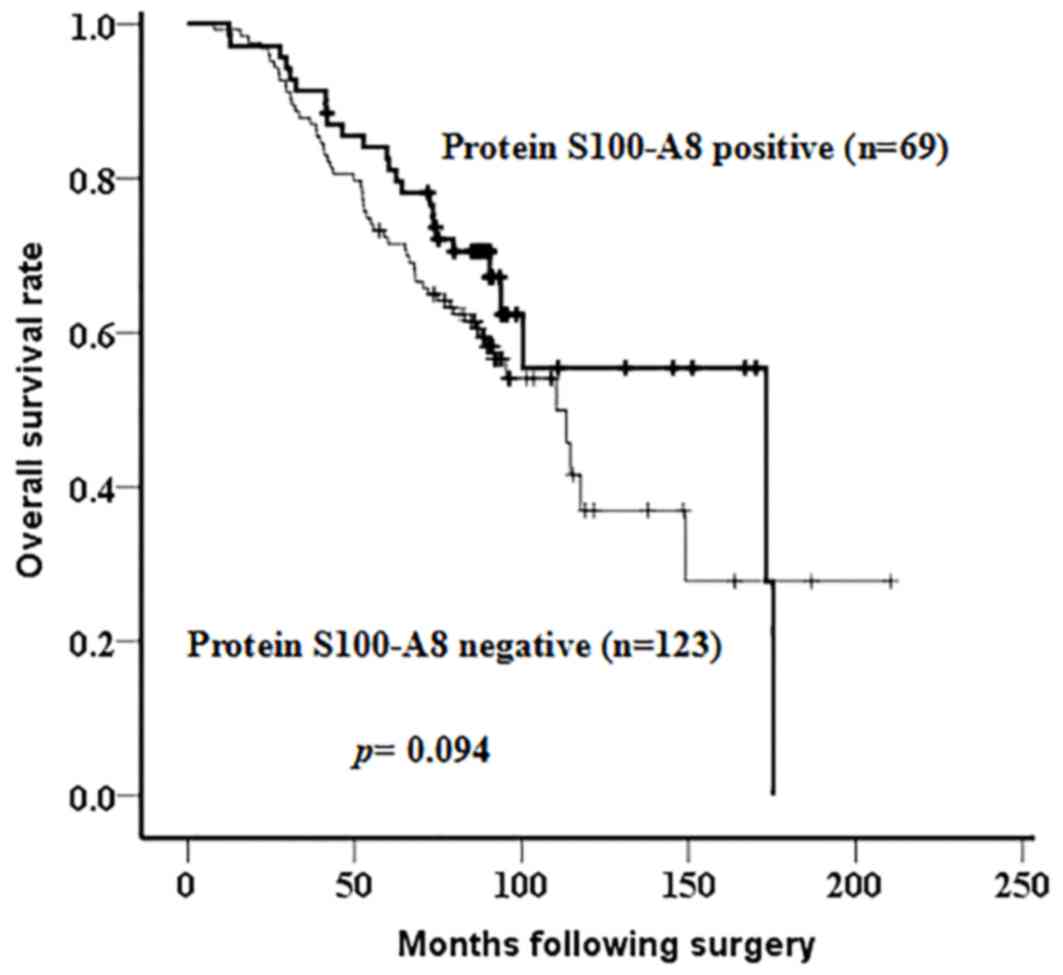|
1
|
Torre LA, Bray F, Siegel RL, Ferlay J,
Lortet-Tieulent J and Jemal A: Global cancer statistics, 2012. CA
Cancer J Clin. 65:87–108. 2015. View Article : Google Scholar : PubMed/NCBI
|
|
2
|
Libson S and Lippman M: A review of
clinical aspects of breast cancer. Int Rev Psychiatry. 26:4–15.
2014. View Article : Google Scholar : PubMed/NCBI
|
|
3
|
Zeng H, Zheng R, Zhang S, Zou X and Chen
W: Female breast cancer statistics of 2010 in China: Estimates
based on data from 145 population-based cancer registries. J Thorac
Dis. 6:466–470. 2014.PubMed/NCBI
|
|
4
|
Ferlay J, Soerjomataram I, Dikshit R, Eser
S, Mathers C, Rebelo M, Parkin DM, Forman D and Bray F: Cancer
incidence and mortality worldwide: Sources, methods and major
patterns in GLOBOCAN 2012. Int J Cancer. 136:E359–E386. 2015.
View Article : Google Scholar : PubMed/NCBI
|
|
5
|
Weigelt B, Peterse JL and van't Veer LJ:
Breast cancer metastasis: Markers and models. Nat Rev Cancer.
5:591–602. 2005. View
Article : Google Scholar : PubMed/NCBI
|
|
6
|
Pinheiro DJ, Elias S and Nazário AC:
Axillary lymph nodes in breast cancer patients: Sonographic
evaluation. Radiol Bras. 47:240–244. 2014. View Article : Google Scholar : PubMed/NCBI
|
|
7
|
Hill JJ, Tremblay TL, Pen A, Li J,
Robotham AC, Lenferink AE, Wang E, O'Connor-McCourt M and Kelly JF:
Identification of vascular breast tumor markers by laser capture
microdissection and label-free LC-MS. J Proteome Res. 10:2479–2493.
2011. View Article : Google Scholar : PubMed/NCBI
|
|
8
|
Zeng Q, Zhang P, Wu Z, Xue P, Lu D, Ye Z,
Zhang X, Huang Z, Feng J, Song L, et al: Quantitative proteomics
reveals ER-α involvement in CD146-induced epithelial-mesenchymal
transition in breast cancer cells. J Proteomics. 103:153–169. 2014.
View Article : Google Scholar : PubMed/NCBI
|
|
9
|
Lagadec C, Romon R, Tastet C, Meignan S,
Com E, Page A, Bidaux G, Hondermarck H and Le Bourhis X: Ku86 is
important for TrkA overexpression-induced breast cancer cell
invasion. Proteomics Clin Appl. 4:580–590. 2010. View Article : Google Scholar : PubMed/NCBI
|
|
10
|
Chen ZC: Advances in cancer proteomics
study. Ai Zheng. 23:113–117. 2004.(In Chinese). PubMed/NCBI
|
|
11
|
Zeng L, Zhong J, He G, Li F, Li J, Zhou W,
Liu W, Zhang Y, Huang S, Liu Z and Deng X: Identification of
nucleobindin-2 as a potential biomarker for breast cancer
metastasis using iTRAQ-based quantitative proteomic analysis. J
Cancer. 8:3062–3069. 2017. View Article : Google Scholar : PubMed/NCBI
|
|
12
|
Choi DK, Li ZJ, Chang IK, Yeo MK, Kim JM,
Sohn KC, Im M, Seo YJ, Lee JH, Kim CD and Lee Y:
Clinicopathological roles of S100A8 and S100A9 in cutaneous
squamous cell carcinoma in vivo and in vitro. Arch Dermatol Res.
306:489–496. 2014. View Article : Google Scholar : PubMed/NCBI
|
|
13
|
Foell D and Roth J: Proinflammatory S100
proteins in arthritis and autoimmune disease. Arthritis Rheum.
50:3762–3771. 2004. View Article : Google Scholar : PubMed/NCBI
|
|
14
|
Basso D, Bozzato D, Padoan A, Moz S,
Zambon CF, Fogar P, Greco E, Scorzeto M, Simonato F, Navaglia F, et
al: Inflammation and pancreatic cancer: Molecular and functional
interactions between S100A8, S100A9, NT-S100A8 and TGFβ1. Cell
Commun Signal. 12:202014. View Article : Google Scholar : PubMed/NCBI
|
|
15
|
Choi JH, Shin NR, Moon HJ, Kwon CH, Kim
GH, Song GA, Jeon TY, Kim DH, Kim DH and Park DY: Identification of
S100A8 and S100A9 as negative regulators for lymph node metastasis
of gastric adenocarcinoma. Histol Histopathol. 27:1439–1448.
2012.PubMed/NCBI
|
|
16
|
Mirza Z, Schulten HJ, Farsi HM,
Al-Maghrabi JA, Gari MA, Chaudhary AG, Abuzenadah AM, Al-Qahtani MH
and Karim S: Impact of S100A8 expression on kidney cancer
progression and molecular docking studies for kidney cancer
therapeutics. Anticancer Res. 34:1873–1884. 2014.PubMed/NCBI
|
|
17
|
Duan L, Wu R, Ye L, Wang H, Yang X, Zhang
Y, Chen X, Zuo G, Zhang Y, Weng Y, et al: S100A8 and S100A9 are
associated with colorectal carcinoma progression and contribute to
colorectal carcinoma cell survival and migration via Wnt/b-catenin
pathway. PLoS One. 26:e620922013. View Article : Google Scholar
|
|
18
|
The UniProt Consortium, . UniProt: The
universal protein knowledgebase. Nucleic Acids Res. 45:D158–D169.
2017. View Article : Google Scholar : PubMed/NCBI
|
|
19
|
Chang X, Xu X, Ma J, Xue X, Li Z, Deng P,
Zhang S, Zhi Y, Chen J and Dai D: NDRG1 expression is related to
the progression and prognosis of gastric cancer patients through
modulating proliferation, invasion and cell cycle of gastric cancer
cells. Mol Biol Rep. 41:6215–6223. 2014. View Article : Google Scholar : PubMed/NCBI
|
|
20
|
Gastl G, Spizzo G, Obrist P, Dünser M and
Mikuz G: Ep-CAM overexpression in breast cancer as a predictor of
survival. Lancet. 356:1981–1982. 2000. View Article : Google Scholar : PubMed/NCBI
|
|
21
|
Chlebowski RT, Kuller LH, Prentice RL,
Stefanick ML, Manson JE, Gass M, Aragaki AK, Ockene JK, Lane DS,
Sarto GE, et al: Breast cancer after use of estrogen plus progestin
in postmenopausal women. N Engl J Med. 360:573–587. 2009.
View Article : Google Scholar : PubMed/NCBI
|
|
22
|
Liu D, Chen Y, Deng M, Xie G, Wang J,
Zhang L, Liu Q, Yuan P and Feng X: Lymph node ratio and breast
cancer prognosis: A meta-analysis. Breast Cancer. 21:1–9. 2014.
View Article : Google Scholar : PubMed/NCBI
|
|
23
|
Ursaru M, Jari I, Popescu R, Negru D, Naum
A and Scripcariu V: Multifactorial analysis of local and lymph node
recurrences after conservative or radical surgery for stage 0–II
breast cancer. Rev Med Chir Soc Med Nat Lasi. 118:1062–1067.
2014.
|
|
24
|
Foell D, Wittkowski H, Vogl T and Roth J:
S100 proteins expressed in phagocytes: A novel group of
damage-associated molecular pattern molecules. J Leukoc Biol.
81:28–37. 2007. View Article : Google Scholar : PubMed/NCBI
|
|
25
|
Kim SK, Kim EJ, Leem SH, Ha YS, Kim YJ and
Kim WJ: Identification of S100A8-correlated genes for prediction of
disease progression in non-muscle invasive bladder cancer. BMC
Cancer. 10:212010. View Article : Google Scholar : PubMed/NCBI
|
|
26
|
Cross SS, Hamdy FC, Deloulme JC and Rehman
I: Expression of S100 proteins in normal human tissues and common
cancers using tissue microarrays: S100A6, S100A8, S100A9 and
S100A11 are all overexpressed in common cancers. Histopathology.
46:256–269. 2005. View Article : Google Scholar : PubMed/NCBI
|
|
27
|
Salama I, Malone PS, Mihaimeed F and Jones
JL: A review of the S100 proteins in cancer. Eur J Surg Oncol.
34:357–364. 2008. View Article : Google Scholar : PubMed/NCBI
|
|
28
|
Hermani A, Hess J, De Servi B, Medunjanin
S, Grobholz R, Trojan L, Angel P and Mayer D: Calcium-binding
proteins S100A8 and S100A9 as novel diagnostic markers in human
prostate cancer. Clin Cancer Res. 11:5146–5152. 2005. View Article : Google Scholar : PubMed/NCBI
|
|
29
|
Katanov C, Lerrer S, Liubomirski Y,
Leider-Trejo L, Meshel T, Bar J, Feniger-Barish R, Kamer I,
Soria-Artzi G, Kahani H, et al: Regulation of the inflammatory
profile of stromal cells in human breast cancer: Prominent roles
for TNF-α and the NF-κB pathway. Stem Cell Res Ther. 6:872015.
View Article : Google Scholar : PubMed/NCBI
|
|
30
|
Gebhardt C, Németh J, Angel P and Hess J:
S100A8 and S100A9 in inflammation and cancer. Biochem Pharmacol.
72:1622–1631. 2006. View Article : Google Scholar : PubMed/NCBI
|
|
31
|
Fu WN, Guo Y, Huang DF, Shang C and Sun
KL: Novel partners of S100A8 identified in laryngeal cancer cell
lines. Zhonghua Yi Xue Yi Chuan Xue Za Zhi. 24:266–270.
2007.PubMed/NCBI
|
|
32
|
Taccioli C, Wan SG, Liu CG, Alder H,
Volinia S, Farber JL, Croce CM and Fong LY: Zinc replenishment
reverses overexpression of the proinflammatory mediator S100A8 and
esophageal preneoplasia in the rat. Gastroenterology. 136:953–966.
2009. View Article : Google Scholar : PubMed/NCBI
|
|
33
|
Parris TZ, Kovács A, Aziz L, Hajizadeh S,
Nemes S, Semaan M, Forssell-Aronsson E, Karlsson P and Helou K:
Additive effect of the AZGP1, PIP, S100A8 and UBE2C molecular
biomarkers improves outcome prediction in breast carcinoma. Int J
Cancer. 134:1617–1629. 2014. View Article : Google Scholar : PubMed/NCBI
|
|
34
|
Funk S, Mark R, Bayo P, Flechtenmacher C,
Grabe N, Angel P, Plinkert PK and Hess J: High S100A8 and S100A12
protein expression is a favorable prognostic factor for survival of
oropharyngeal squamous cell carcinoma. Int J Cancer. 136:2037–2046.
2015. View Article : Google Scholar : PubMed/NCBI
|
|
35
|
Arai K, Takano S, Teratani T, Ito Y,
Yamada T and Nozawa R: S100A8 and S100A9 overexpression is
associated with poor pathological parameters in invasive ductal
carcinoma of the breast. Curr Cancer Drug Targets. 8:243–252. 2008.
View Article : Google Scholar : PubMed/NCBI
|
|
36
|
Kwon CH, Moon HJ, Park HJ, Choi JH and
Park DY: S100A8 and S100A9 promotes invasion and migration through
p38 mitogen-activated protein kinase-dependent NF-κB activation in
gastric cancer cells. Mol Cells. 35:226–234. 2013. View Article : Google Scholar : PubMed/NCBI
|
|
37
|
Silva EJ, Argyris PP, Zou X, Ross KF and
Herzberg MC: S100A8/A9 regulates MMP-2 expression and invasion and
migration by carcinoma cells. Int J Biochem Cell Biol. 55:279–287.
2014. View Article : Google Scholar : PubMed/NCBI
|


















